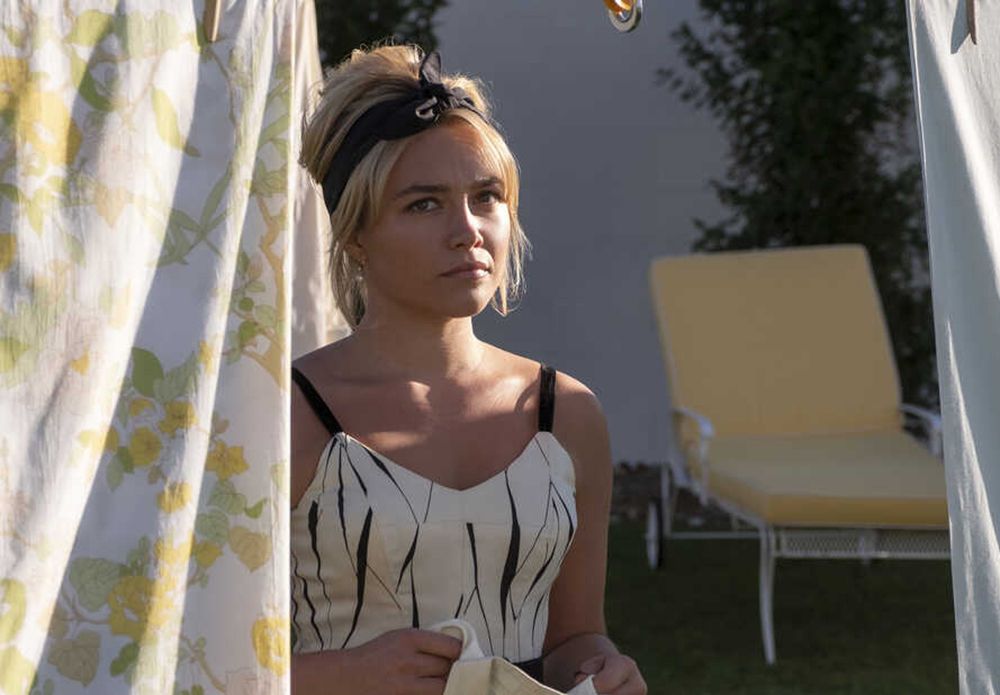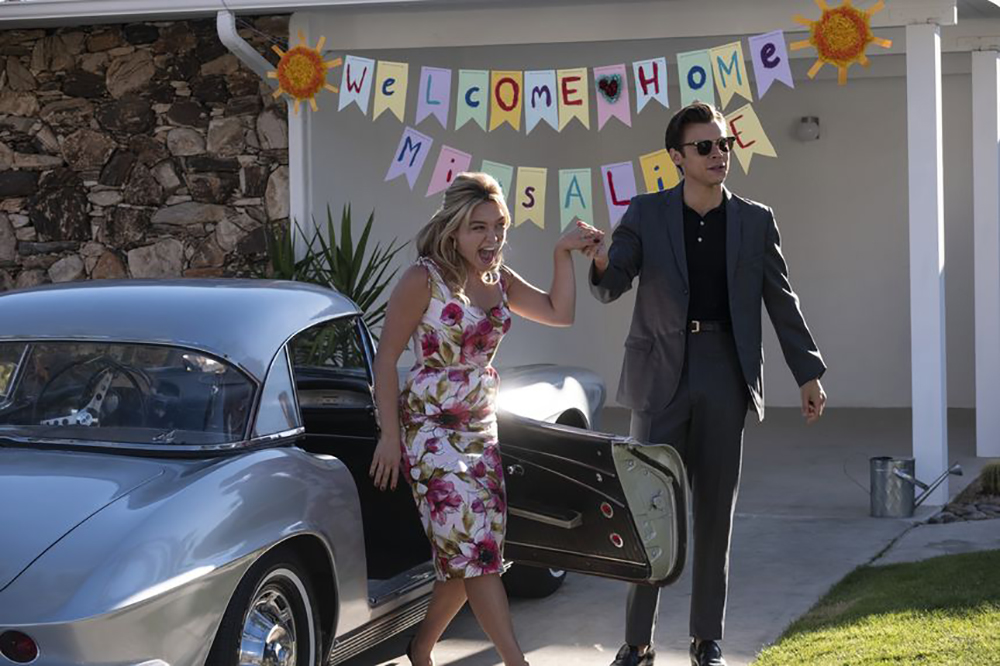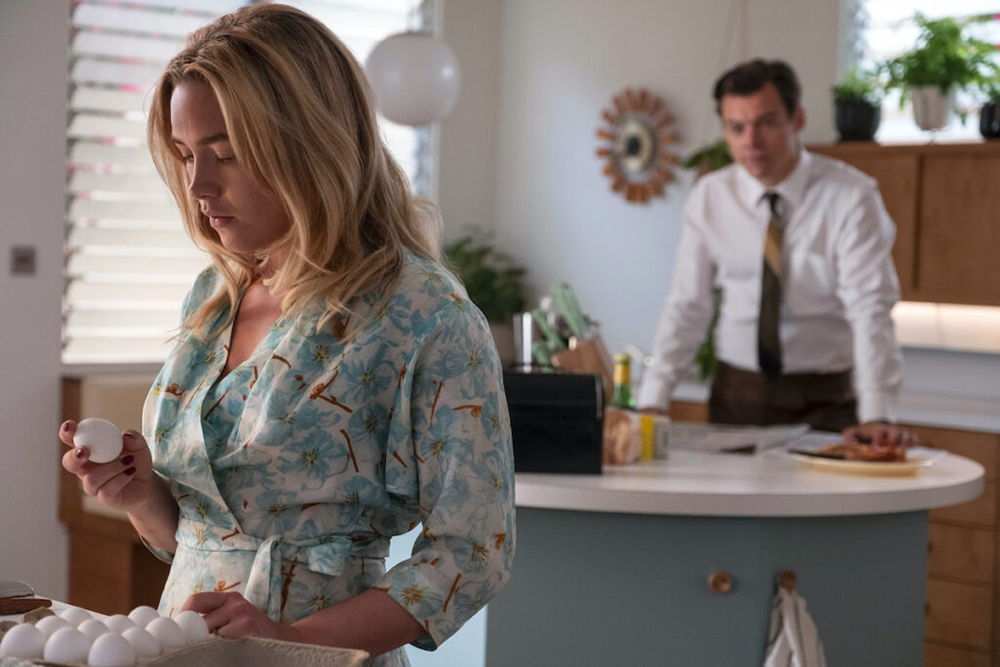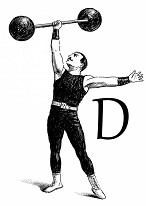Olivia Wilde’s follow-up to her hit directorial debut “Booksmart,” “Don’t Worry Darling,” is the precise definition of being less than the sum of its parts. There’s glossiness in its production and craft (costumes, art direction, makeup), a good performance by Florence Pugh (as always), and stimulating short sequences. However as it extends itself, the weaker the film gets—showcasing its inert nature lacking vivacity.
In 2019, Olivia Wilde blessed us with her hilarious and heartfelt directorial debut, “Booksmart.” Although some of its coming-of-age elements were “by the books,” the film was effervescently charming thanks to its endearing script and cast—especially its leading ladies, Kaitlyn Dever and Beanie Feldstein. “Booksmart” made us laugh and caused several people to relate to its characters. It created a special cinematic treat that caught plenty by surprise.
Much Anticipation and Talk About Olivia Wilde’s Follow-Up
Much anticipation was attached to Wilde’s follow-up. What was she going to do next? Was it going to be another comedy? When will it arrive? For her sophomore feature, titled “Don’t Worry Darling,” Wilde does something that nobody expected. She creates a high-budgeted mystery-thriller with “Twilight Zone” and “The Stepford Wives” inflictions. She also wanted to add some “The Matrix,” “Repulsion,” “Mad Men,” “Perfect Blue,” and “Black Swan” elements. All of this sounds like a lot, and it is, but all of us were excited. This was right until the trailer arrived, along with rumors of bad-blood discussions and backstage arguments.
That doesn’t diminish the picture. On the contrary, it made many people look forward to the film, as they didn’t know what to expect when they came across it. Unfortunately, however, the controversy and headlines of its fractured set were more interesting than the film itself. Sure, some moments have a bit of spark in them, where one could sense Wilde’s talents. However, for the most part, it is just lacking in all storytelling facets and structures. It implements one idea after the next with zero correlation to where the film wants to head narrative-wise. This is better defined as style over substance. It is set in the 1950s—or in a curated place that resembles the decade—on an elegant, lush suburban utopia in the American desert meant to reflect perfection, wealth, and good living, named Victory. This place is exists for the “perfect” (although, from its initial moments, one knows that it is all a mirage of some sort). It carries freshly cut lawns, jolly neighbors, dapper clothing, great meals, beautiful houses, fast cars, and everything one could imagine.
A Lack of Chemistry Between Pugh and Styles

Inside that community lives the young married couple of Alice and Jack Chamber (Florence Pugh and Harry Styles, respectively). While Alice stays home or does some activities, Jack leaves to work on the secretive Victory Project. This is helmed by its sinister CEO with a televangelist persona, Frank (Chris Pine). Frank preaches about progress, innovation, and togetherness in wealth to keep everyone tied in the mirage of false appearances this town is trying to sell to its members. However, there are darker secrets amidst the mountains and desert plains. And Alice, after having experienced several visions and nightmares, goes into detective mode to unravel the mysteries behind what lies beneath the mirrorings of Victory’s “perfect” life. This is her descent into sun-bathed psychosis after being gaslighted into believing the fallacies spoken by the town’s folk and chief in command. The film reveals the horror of her reality with every step Alice takes along her journey.
The problems in “Don’t Worry Darling” are plentiful. People may think that the amalgamation of ideas and ripped-off concepts from films and their respective directors (primarily Bryan Forbes’ “The Stepford Wives,” which Jordan Peele borrowed elements of for his directorial debut, “Get Out”) might be the problem that breaks the entire film into multiple pieces. It isn’t, up to a certain point. Taking similar cues and inspiration to meld a film’s ideas about society isn’t a problem. The thing, though, is that the director and screenwriters need to express their thoughts and concepts with originality and heft.
Also Read: Review: Jordan Peele’s ‘Nope’ is a Mesmerizing and Bewitching Spielbergian Sci-Fi/Horror Arrangement
The main issues here are the lack of dissection and exploration of the ideas that the film’s screenplay touches upon—the darkness within the American dream, controlling men, cult-like societies, patriarchal societies, and the female experience, among others—and its focus on veneer over effect, classiness over significance. Those are the two critical difficulties that keep “Don’t Worry Darling” from being a compelling thriller and a reflective piece about control, subjugation, and manipulation.
A Disappointing and Ineffective Thriller

It’s tragically underwritten; its focus is on glamor instead of substance. And although one might enjoy those particular sequences, the film doesn’t leave a lot to hold onto. There is one thing that everyone will join hands in agreement on: Florence Pugh delivers a good performance, even if she’s drowning in a poor script. Pugh doesn’t sell the lines to the audience, but she makes the best of it with her powerful screen presence and great acting chops. What she does sell is the feeling that “Don’t Worry Darling” wants to convey. These are the claustrophobic sensations when she wraps her head in plastic, and when the wall moves forward to squeeze her, the stupor amidst the multiple falsehoods, the gaslighting, and her inner angst. Then comes her screen partner, pop-superstar Harry Styles, who has the looks, but his persona is bland, even buttery. Styles isn’t a total trainwreck in terms of performance, but he does lack skill and emotion. His on-screen persona is just too monotonous and flavorless for audiences to engage with him. While Pugh has fiery intensity, Styles is just wooden. This creates a disparity in the leads’ chemistry, which there isn’t any.
“Don’t Worry Darling” is a molotov cocktail. It is a mixture of the aforementioned films and television series combined to create a dumpster fire. There are glimpses of skill and directorial heft, which showcases that Wilde has talent behind the camera with stimulating sequences (at least artistically). Her debut wasn’t a fluke. She has the talent to be a prominent filmmaker, and I want to see Wilde keep concocting fascinating stories. However, the film she wants to make is too much of a dapper mess. It is an array of half-baked ideas that add up to nothing much more than a world of mirages (with a “plot twist” that will have plenty of people feeling like they want to punch a wall) by the time its end credits arrive. Evidently, and from the end of its first act, “Don’t Worry Darling” ends up being a highly disappointing and ineffective thriller. Its many ideas spark intrigue, but they are treated poorly. It may be stylish and glossy, with a good performance by Florence Pugh right in the middle of it. However, there’s no clear vision of precisely what it wants to be—rendered hollow.
“Don’t Worry Darling” is currently only available to watch in theaters.
Support the Site: Consider becoming a sponsor to unlock exclusive, member-only content and help support The Movie Buff!


